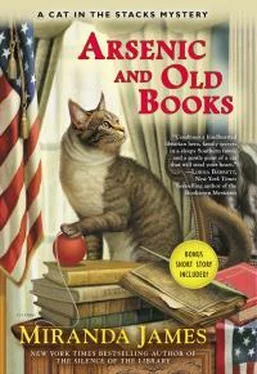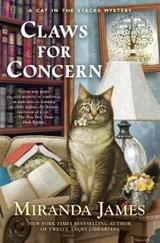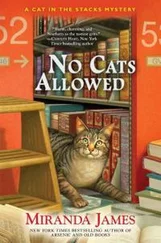“What makes you think it’s a fake?” Stewart asked.
“The contents,” I said. “From what I can see, the paper, the ink, and the handwriting are similar. But the time period covered in this volume is also covered in one of the original four Mrs. Long brought.”
“Tell me the whole story,” Stewart said. “I’ve got time, and before I get involved with this, I want to know what’s really going on.”
That was a fair request. I gave him the salient facts as I saw them. When I finished, he shook his head. “The Longs have always been snobs, but this really takes the gâteau .” He shifted in his chair. “Do you think the mayor ran Marie down, then?”
“I don’t know,” I said. “I’m really not sure how the murder fits into this mud-slinging scheme. Unless Marie managed to figure it out and threatened to expose it.”
“I’ll leave that up to you and your buddy Kanesha.” Stewart grinned. “Have you told her yet that you think you’ve got a fake on your hands?”
“No, I haven’t. I wanted to have some kind of evidence before I tell her and suggest she send it for a more thorough investigation.”
“And that’s where I come in.” Stewart looked thoughtful. “I’m sure you don’t want me to do anything to harm the integrity of these books. Probably the easiest thing would be for me to examine the paper and ink with the microscope.”
“What would that tell you?” I asked.
“I can compare the fibers in the paper, to start with,” Stewart replied. “Then I can look at the ink, see how it has bonded with the paper, for example. If one was written back during the Civil War and the other one only recently, there will be noticeable differences.”
I forestalled him before he launched into a more technical explanation. “If you do find these differences, then I’ll feel more confident about calling Kanesha and telling her what I suspect. When will you be able to do it?”
Stewart smiled. “I don’t have class this afternoon, so I can work on it now. I’ll take the suspected fake and one of the others and compare them.”
“Thanks. I really appreciate this,” I said. “I’ve got a box here you can take them in.” I put the suspected fake and the final volume of the four original ones into the box for him.
“I’ll bring them back when I’ve finished,” Stewart said. “Shouldn’t take too long if I can get into one of the labs and find the appropriate tools available. This time of the semester the labs are pretty full.”
Diesel warbled and trilled a good-bye as Stewart left. He called a farewell to the cat before he disappeared into the hallway.
I turned in my chair to regard the cat. Diesel gazed sleepily at me. He meowed, and I rubbed his head.
“I can’t stay mad at you for long,” I told him. He purred and pushed his head against my hand. “I’m going to have to pay more attention, though.”
Diesel settled down after a bit more love, and I tried to focus on what I needed to do next. I had to keep busy or else I’d be staring at the phone every other minute, silently urging Stewart to call.
My glance fell on the diary volume with the missing pages, and my thoughts homed in on the time period of those pages. What had happened in the summer of 1863 in Athena?
I picked up the dissertation. Too bad it didn’t have an index, I thought. Instead of looking up pages where any of the Long family was mentioned, I’d have to read or skim through the text.
After the chapter on the early history of Athena, the author of the dissertation focused more tightly on the years of the war and its aftermath. I started skimming, looking for mentions of the Long and Singletary families. After fifty pages or so, I found what I was looking for.
Tragedy befell the Long family twice in rapid succession in the summer of 1863 with the deaths of both Andrew Long Senior and his son, Major Andrew Long Junior. The major, badly wounded during the Battle of Gettysburg in early July, and no longer able to serve, somehow managed to make it home to Bellefontaine by mid-August. He remained secluded there with his wife, son, and father until his death. Several of the town’s prominent citizens called upon the family to welcome Major Long home, but were turned away by his wife, Rachel. The major’s wounds were so disfiguring, she told them, the major refused to see anyone.
The footnote to this paragraph cited the letters of one Josiah Rhodes, who was evidently the Longs’ banker. The author of the dissertation went on to say that word reached the town in late September of 1863 that the major had succumbed to a fever, and shortly after, his father died as well. Mrs. Long was left with her young son and a few servants at Bellefontaine.
I had seen photographs of the carnage wrought by the Civil War and the grievous wounds borne by the soldiers who survived. I could understand that a proud man might not care to be seen and pitied by anyone other than his family. The Battle of Gettysburg had the highest casualties of any battle during the war, with more than twenty thousand of them from Lee’s Army of Northern Virginia. Meade’s Army of the Potomac sustained a similar number.
I put the book aside, my question about the death of Major Andrew Long answered. Time now to focus again on Rachel’s diaries. Ordinarily I would have started at the beginning, but because of the questions I had regarding the diary I thought was fake, I started with the volume with the missing pages. There might be clues in other parts of the diary that could be helpful.
For the next forty-five minutes I read steadily, and I paused every few minutes to make sure Diesel remained on the windowsill. I also cast a few glances at the phone, wishing Stewart would call, but I had no idea how long it would take him to examine the paper and ink. I hoped he had been able to find the equipment he needed and hadn’t had to wait for it to become free.
The office phone rang while I was standing and stretching in front of the desk. I snatched up the receiver.
“Charlie, I’ve got an answer for you,” Stewart said without preamble. “Based on my analysis, I’d say this one volume is definitely a fake. The inks don’t match, though the paper does.”
THIRTY-TWO
Stewart continued before I could respond. “I used Raman spectroscopy, which basically gives a fingerprint of the ink. The paper, too. It’s a fast test and noninvasive as well.”
“Noninvasive is good,” I said.
“Now, about the ink,” Stewart said. “I did a bit of research on nineteenth-century inks before I did the tests. You probably know about iron gall ink already, so I won’t bore you with the details. I found spectra online for iron gall ink. There has been a fair amount of research on it related to historical documents. For one thing, it’s corrosive over time, and it leaves telltale evidence of that.
“When I looked at the spectra for the ink in the two volumes, I could see that the spectra were similar in a couple of respects. The forger obviously tried to duplicate the iron gall ink but the formula wasn’t the same. The other giveaway is that the ink hasn’t caused corrosion in the forged diary.”
My head buzzed a bit with the details, but the result was clear. The fifth volume of the diary was a forgery, and I was certain I knew the identity of the forger: Lucinda Beckwith Long.
“Thanks, Stewart,” I said. “I’m going to call Kanesha right away and tell her about this. I need to get the diaries back, though. Shall Diesel and I walk over and retrieve them?”
“No, I’ll bring them back to you,” Stewart said. “I’ll be heading home anyway. Got a hot date tonight to get ready for, and you know it takes me simply ages to look my best.”
Читать дальше












